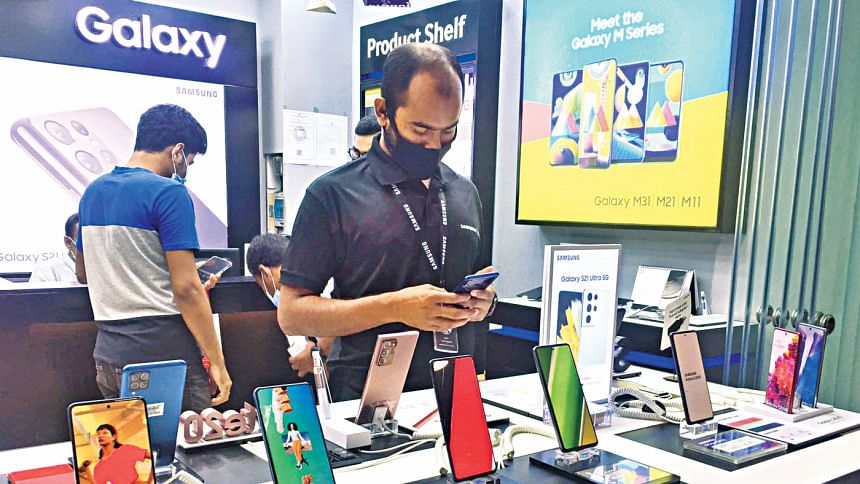Operators eye SIM-locked phones to ramp up 4G use

Mobile phone operators are seeking permission from the government to sell network-locked or fixed-SIM handsets at lower prices so that more people can afford smartphones and use 4G service.
A SIM (subscriber identification module) lock or network lock is a technical restriction built into mobile phones by manufacturers to restrict the use of the devices in specific countries or networks.
Operators in Bangladesh now want to sell 4G-enabled handsets in cooperation with manufacturers on instalments ranging from 12 months to 24 months.
The Association of Mobile Telecom Operators of Bangladesh (AMTOB) and handset manufacturers have jointly placed a proposal to the telecom regulator as the use of fourth-generation (4G) services is not growing as expected due to the high price of smartphones.
"We are analysing the proposal, and we will make a decision soon," said Md Shahidul Alam, director-general for spectrum at the Bangladesh Telecommunication Regulatory Commission (BTRC).
He said handset prices were at a tolerable level, so selling the devices in instalments would not suffice.
"Operators will have to make an attractive offer to customers. Then, 4G subscribers will grow at a faster rate."
Under the proposal, customers will have to buy the handset from an operator, and the operator's SIM must be used until the repayment period is over.
In Bangladesh, 4G was introduced in 2018. Twenty-eight per cent of the mobile phone subscribers currently use the service, although 4G capabilities can cover 95 per cent of internet users.
There has been an information technology revolution in the past few years, buoyed by a surge in mobile and internet users in the country. But customers are not happy about the quality of the service.
Operators say they have set up more than 36,000 4G sites and spent heavily in other areas, such as purchasing spectrum.
According to the AMTOB, four operators have invested Tk 28,000 crore in the 4G service.
To increase the number of 4G subscribers, the AMTOB plans to sell handsets on instalments by locking them to a specific carrier.
SIM-lock handsets are in use in many countries.
In India, Jio offers 4G-enabled mobile phones under its own brand. The handset can only be used with the company's SIM.
In Bangladesh, operators plan to bring 100 per cent of the population under 4G coverage by 2025.
According to their estimate, 40 per cent of the customers will use 4G in 2021, 60 per cent in 2022, 75 per cent in 2023, 85 per cent in 2024, and 100 per cent in 2025.
More than 101 million out of 173 million mobile subscribers use the internet, according to the Bangladesh Telecommunication Regulatory Commission (BTRC).
Second-generation (2G) subscribers make up 48 per cent of the subscribers, and 3G subscribers account for the remaining 24 per cent. Bangladesh has the biggest gap in regards to 4G and 3G users in South Asia.
The AMTOB blames the high price of 4G-enabled devices for the lower number of users.
As a result, more than eight crore subscribers still use basic or feature phones. If smartphones could be handed over to these customers at the price of a feature phone, they could be brought under the 4G umbrella.
Zakaria Shahid, general secretary of the Bangladesh Mobile Phone Importers Association, said network operators could not use their brand name on the phone by crossing out manufacturers' names.
"We have agreed to go for co-branding. They can sell handsets of existing brands as well."
Shahid said that manufacturers had nothing to do with reducing prices because there are many other issues involved, including taxes.
Manufacturers and importers say it is not possible to cut the price of smartphones. Besides, the price of locally made handsets is already low compared to other countries.
"A customer buys a phone once every three to four years, but they use it every day. So, operators should make attractive offers when customers buy a handset, whether the network is locked or not," Shahid said.
SM Farhad, secretary-general of the AMTOB, said mobile operators and manufacturers would take the next course of action to decide whether they would go for carrier-locked or SIM-locked phones following the green light from the BTRC.

 For all latest news, follow The Daily Star's Google News channel.
For all latest news, follow The Daily Star's Google News channel. 



Comments